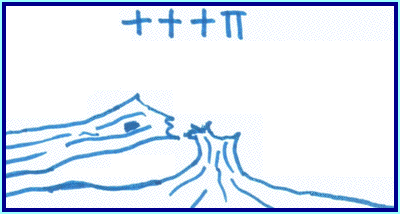CCLXII
Introduction
The First One | The Previous One | The Next One | | The Last One

![]()
Kaðweluš iva.
"A tree has fallen."
In the early days of the reign of Rage Nasko, there was a gardener in the employ of the palace whose name is unknown. As legend has it, he was wandering through the orchards (some say to steal fruit) one day, when he witnessed a tree falling over. There are those that maintain that the tree was struck by lightning, and this frightened the garden, causing him to run in fear. Others proclaim that the tree was old, and had, perhaps, caught a disease of some kind, and happened to collapse while the garden was walking by. Still others claim that the gardener, a member of a secret organization plotting the downfall of Ansenlas (its name unknown), cut the tree down himself, and claimed that it had fallen. Whatever the reason, what happened after is fairly certain. The gardener ran in fear (feigned or genuine, depending on whose account you believe) to his supervisor, the groundskeeper, and shouted, Kaðweluš iva!.
The groundskeeper was an elderly gentleman, as the story goes, and was well-respected (or well-liked, at least) by the members of the court who had been present before Nasko took the throne. The years had not been kind to him, though, so he used a cane to slowly hobble over to one of the anyožal he knew well and whisper in a hoarse voice, Kaðweluš iva! The anyožal asked him for clarification, but the groundskeeper would only try to shoo him away, saying, Rustage!, roughly, "To the king!"
Unfortunately, the age of the groundskeeper and the respect that that anyožal had for him worked to their disadvantage. Though the u sound had been lost at the end of a word following r or l in the speech of most speakers of Sathir at the time, its presence was still felt. Indeed, one way to imitate the speech of the elderly was to add additional u's (often incorrectly) to the ends of words. Additionally, older speakers dispreferred word-final š, favoring the older form si. As a result, the anyožal believed that what the groundskeeper had actually said was Kaðwelu šiva, which means, "Bring down a carpet". This didn't make much sense to him, but if the groundskeeper had said Ristage! instead of Rustage!, the phrases combined would mean, "Bring down a carpet for the king", which at least makes some sense. Assuming, then, that he had misheard the groundskeeper, and that he actually had said Ristage!, he went to report to Anyožal Khanthol.
O, but the stars were misaligned in Ansenlas that fateful day! When Anyožal Khanthol heard the message Kaðwel šiva ristage, he interpreted it as, "Bring down (i.e., take down, or, more bluntly, kill) Šiva for the king". As it so happened, a visiting dignitary from Njaamay named Síwa (or, in Sathir, Šiva) was scheduled to meet with Rage Nasko that very day. Khanthol, eager to win favor in the eyes of Nasko, elected not to verify the information he'd received, and instead went directly to Twolone, the king's bodyguard, and told him that he had been informed of a plot to assassinate the king. Shortly thereafter, Twolone went with an armed escort to the east wing of the palace, where Šiva was staying, and slew her on the spot. This incident led directly to the twenty-first great war between Ansenlas and Njaamay.
Today, this izanyoža is used to indicate that, somehow, there has been a miscommunication as a result of a message being passed from one mouth to another. Traditionally, this izanyoža is uttered after the misinformation that has been disseminated has done the most damage it can possibly do, in honor of Khanthol and Twolone and their accidental assassination which led to one of the longest and bloodiest wars in the history of Ansenlas.
Vocabulary List
- kweluš (v.) to fall (said of an inanimate object, its third person past tense conjugation being kaðweluš)
- iva (n.) tree
- rustage (expr.) go to the king (< rage in the mobile case)
- kwel (v.) to bring down (in older forms, kwelu, which would be conjugated kaðwelu in the third person past tense)
- šiva (n.) carpet
- ristage (expr.) for the king (< rage in the dative case)
The First One | The Previous One | The Next One | | The Last One
Introduction
Back to Sathir Main
